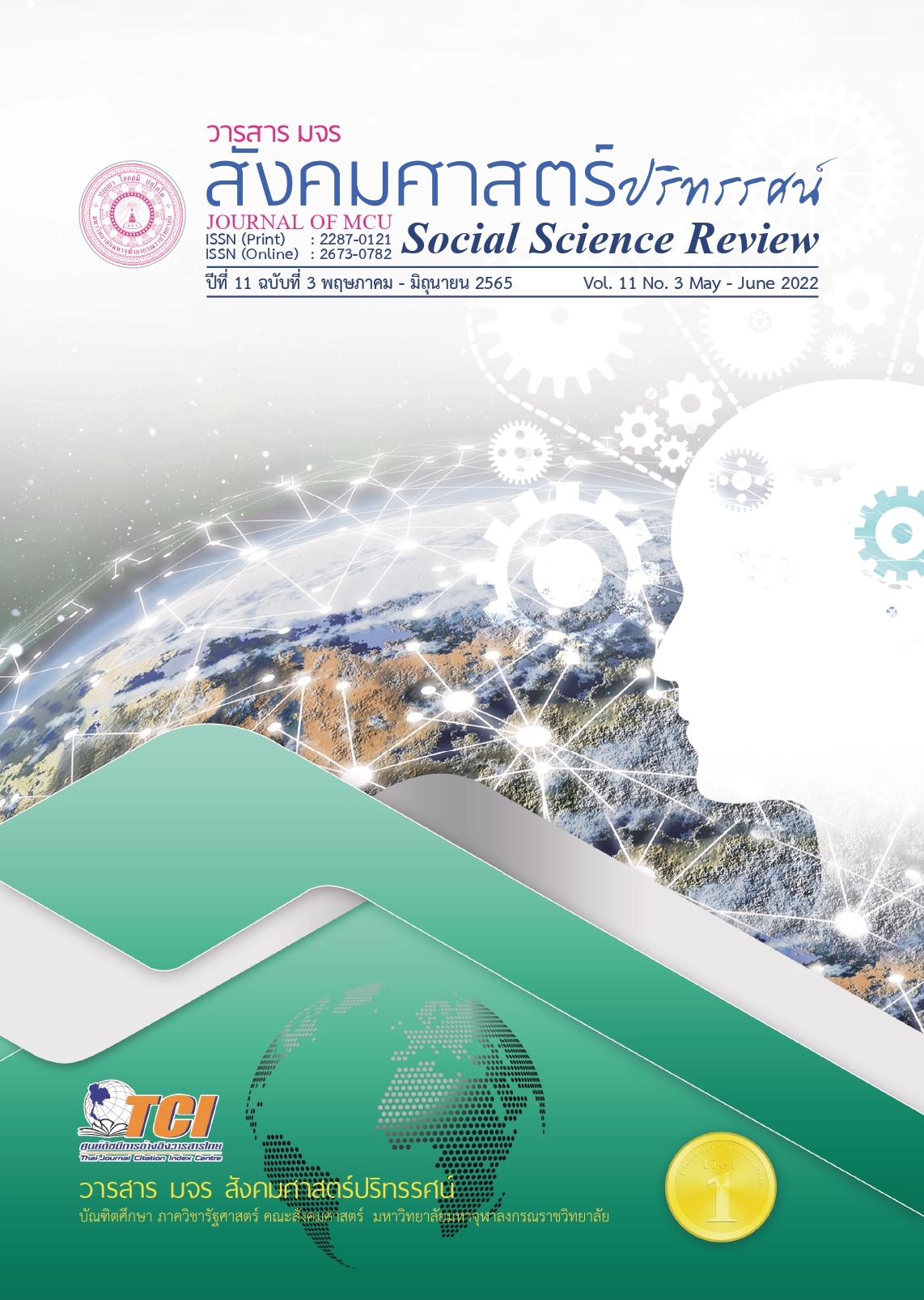การใช้สถานการณ์ปัญหาเพื่อส่งเสริมความมุ่งมั่นจดจ่อของนักเรียน
บทคัดย่อ
การวิจัยครั้งนี้มีวัตถุประสงค์เพื่อศึกษาผลการใช้สถานการณ์ปัญหาเพื่อส่งเสริมความมุ่งมั่นจดจ่อของนักเรียน กลุ่มเป้าหมายของการวิจัยครั้งนี้เป็นนักเรียนชั้นประถมศึกษาปีที่ 5 ปีการศึกษา 2563 จำนวน 12 คน ดำเนินการวิจัยภายใต้กรอบแนวคิดของการศึกษาชั้นเรียน (Lesson Study) และวิธีการแบบเปิด (Open Approach) โดยใช้แผนการจัดการเรียนรู้จำนวน 5 แผน เก็บรวบรวมข้อมูลจากการบันทึกวีดิทัศน์ การสร้างแผนการจัดการเรียนรู้ การนำแผนการจัดการเรียนรู้ไปใช้ในชั้นเรียน การสะท้อนผลร่วมกัน แบบบันทึกภาคสนาม และแบบประเมินความมุ่งมั่นจดจ่อของนักเรียน
ผลการวิจัยพบว่า ในแต่ละแผนการจัดการเรียนรู้ มีความมุ่งมั่นจดจ่อเกิดขึ้นทั้งหมด 4 ด้าน คือ 1. ความมุ่งมั่นจดจ่อด้านพฤติกรรม 2. ความมุ่งมั่นจดจ่อด้านอารมณ์ 3. ความมุ่งมั่นจดจ่อด้านการรู้คิด และ 4. ความมุ่งมั่นจดจ่อด้านการริเริ่มในตนเอง
เอกสารอ้างอิง
ไมตรี อินทร์ประสิทธิ์. (2546). การปฏิรูปกระบวนการเรียนรู้วิชาคณิตศาสตร์ในโรงเรียนโดยเน้นกระบวนการทางคณิตศาสตร์. ขอนแก่น: ขอนแก่นการพิมพ์.
_______. (2549). การปฏิรูปกระบวนการเรียนรู้วิชาคณิตศาสตร์ ของนักเรียนชั้นมัธยมศึกษาด้วยยุทธวิธีปัญหาปลายเปิด. ขอนแก่น: คณะศึกษาศาสตร์ มหาวิทยาลัยขอนแก่น.
_______. (กรกฎาคม 2562). Looking Back Years of The 30 Years Thailand Project นวัตกรรมการศึกษาชั้นเรียนและวิธีการแบบเปิด เพื่อยกระดับคุณภาพชั้นเรียน. ขอนแก่น: ศูนย์วิจัยคณิตศาสตรศึกษา มหาวิทยาลัยขอนแก่น.
_______. (กุมภาพันธ์ 2563). การเขียนแผนการจัดการเรียนรู้ตามแนวทาง KYOZAI KENKYU ในการใช้ “การศึกษาชั้นเรียน” และ“วิธีการแบบเปิด” เพื่อยกระดับคุณภาพการศึกษาอย่างต่อเนื่อง. ศูนย์วิจัยคณิตศาสตรศึกษา มหาวิทยาลัยขอนแก่น.
วิจารณ์ พาณิช. (2556). สนุกกับการเรียนในศตวรรษที่ 21. กรุงเทพฯ: มูลนิธิสดศรีสฤษดิ์วงศ์.
Attard, C. (2014). “I don’t like it, I don’t love it, but I do it and I don’t mind”: introducing a framework for engagement with mathematics. Curriculum Perspective, 34(3), 1.
Fredricks, J. et al. (2004). School engagement: Potential of the concept, state of evidence. Review of Educational Research, 74(1), 59–105.
Gebre, E. et al. (2013). Students’ engagement in technology rich classrooms and its relationship to professors' conceptions of effective teaching. British Journal of Educational Technology, 45(1), 83-96.
Halmos, P. (1980). The heart of mathematics. American Mathematical Monthly, 87, 519-524.
Hmelo-Silver, C. E. (2004). Problem-based learning: What and how do students learn? Educational Psychology Review, 16, 235-266.
Inprasitha, M. (2010). One Feature of Adaptive Lesson Study in Thailand: Designing Learning Unit. In C. S. Cho, et al. (Eds.). Proceedings of the 45th National Meeting of Mathematics Education. (pp. 193-206). Korea: Dongkook University, Gyeongju.
Nohda, N. (2000). Teaching by Open-Approach Method in Japanese Mathematics Classroom. In Nakahara, T., Koyama M. (Eds). Proceeding 24th of the Conference of the International Group for the Psychology of Mathematics Education, 1. (pp. 39-53). Hiroshima: Hiroshima University.
Pease, M.A., & Kuhn, D. (2011). Experimental analysis of the effective components of problem-based learning. Science Education, 95,57-86.
Reeve, J., & Tseng, C.-M. (2011). Agency as a fourth aspect of students’ engagement during learning activities. Contemporary Educational Psychology, 36(4), 257–267.
Reeve, J. (2012). A self-determination theory perspective on student engagement. In S. L. Christenson, A. L. Reschly, & C. Wylie (Eds.), Handbook of research on student engagement. (p. 149–172).
Samson, P. L. (2015). Fostering student engagement: Creative Problem-Solving in small group facilitations. Collected Essays on Learning and Teaching, 8, 153-164.
Schoenfeld, A.H. (1992). Learning to thinking Mathematically: Problem Solving, Metacognition and Sense – Making in Mathematics. In D. Grouws (Ed.). Handbook of Research on Mathematics Teacher and Learning. (pp. 334-370). New York: MacMillan.
Skinner, E. A., & Belmont, M. J. (1993). Motivation in the classroom: Reciprocal effects of teacher behavior and student engagement across the school year. Journal of Educational Psychology, 85, 571–581.
ดาวน์โหลด
เผยแพร่แล้ว
รูปแบบการอ้างอิง
ฉบับ
ประเภทบทความ
สัญญาอนุญาต
ลิขสิทธิ์ (c) 2022 วารสาร มจร สังคมศาสตร์ปริทรรศน์

อนุญาตภายใต้เงื่อนไข Creative Commons Attribution-NonCommercial-NoDerivatives 4.0 International License.
เพื่อให้เป็นไปตามกฎหมายลิขสิทธิ์ ผู้นิพนธ์ทุกท่านต้องลงลายมือชื่อในแบบฟอร์มใบมอบลิขสิทธิ์บทความให้แก่วารสารฯ พร้อมกับบทความต้นฉบับที่ได้แก้ไขครั้งสุดท้าย นอกจากนี้ ผู้นิพนธ์ทุกท่านต้องยืนยันว่าบทความต้นฉบับที่ส่งมาตีพิมพ์นั้น ได้ส่งมาตีพิมพ์เฉพาะในวารสาร มจร สังคมศาสตร์ปริทรรศน์ เพียงแห่งเดียวเท่านั้น หากมีการใช้ภาพหรือตารางหรือเนื้อหาอื่นๆ ของผู้นิพนธ์อื่นที่ปรากฏในสิ่งตีพิมพ์อื่นมาแล้ว ผู้นิพนธ์ต้องขออนุญาตเจ้าของลิขสิทธิ์ก่อน พร้อมทั้งแสดงหนังสือที่ได้รับการยินยอมต่อบรรณาธิการ ก่อนที่บทความจะได้รับการตีพิมพ์ หากไม่เป็นไปตามข้อกำหนดเบื้องต้น ทางวารสารจะถอดบทความของท่านออกโดยไม่มีข้อยกเว้นใดๆ ทั้งสิ้น





